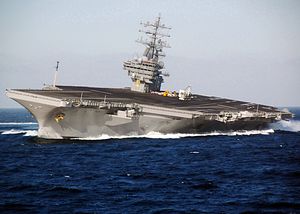The U.S. Pacific Command is slated to hold a large-scale naval exercise, dubbed Valiant Shield 2016, off the coast of Guam and around the Marianas Island Range Complex in the western Pacific Ocean from September 12-23, according to a U.S. Navy statement.
The drill will involve the nuclear-powered Nimitz-class aircraft carrier USS Ronald Reagan, based in Yokosuka Naval Base in Japan’s Kanagawa Prefecture and currently the U.S. Navy’s only forward-deployed aircraft carrier in the Asia-Pacific region, the Wasp-class amphibious assault ship USS Bonhomme Richard and two additional amphibious vessels, and other nine surface warships.
Furthermore, around 180 aircraft from the U.S. Navy, U.S. Air Force, and U.S. Marine Corps will participate in the exercise. Total manpower present at the drill will be around 18,000. Held every two years since 2006, this will be the sixth iteration of the Valiant Shield exercise, which brings together service members from across the U.S. Pacific Command, whose area of responsibility covers over 100 million square miles — approximately 52 percent of the Earth’s surface.
The participating forces will practice amphibious assault, maritime security, anti-submarine warfare, and air defense operations, and others. “This training enables real-world proficiency in sustaining joint forces through detecting, locating, tracking, and engaging units at sea, in the air, on land, and in cyberspace in response to a range of mission areas,” according to the U.S. Navy press release.
U.S. forces will first and foremost practice interoperability. “We train within our own services, but now is the opportunity to train with other branches combined … so it’s really a chance to practice our interoperability, tactics, techniques, and procedures to prove our ability to do that together,” the commanding officer of a participating U.S. Marine Corps aviation logistics squadron said.
“The [Valiant Shield] VS series is aimed at developing a ‘pre-integrated’ joint force built from habitual relationships. This force builds interoperable and complementary cross-domain capabilities and benefits from realistic, shared training, enhancing the flexibility to develop new tactics, techniques, and procedures as operational conditions dictate,” the press release explains.
“When you think of the U.S. military in the Pacific, you want credible combat power,” said Navy Rear Admiral Russell Allen, the U.S. 7th Fleet deputy commander and Valiant Shield exercise director. “The true test of a force is its ability to detect, track, and engage targets with live sensors and weapons systems. The U.S. military does that more than anyone. Simply stated, the experience our forces gain from working together helps us to provide the best possible support to our allies, partners, and friends in the region for a wide variety of missions, when and where they’re needed most.”
During Valiant Shield 2014, China’s People’s Liberation Army Navy dispatched a spy ship to observe the naval exercise.

































